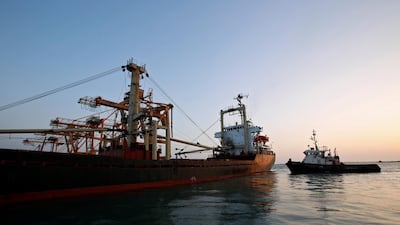Members of the contact group on Yemen, including the United Arab Emirates and Saudi Arabia, hailed progress in re-opening the country’s ports but warned resolving the crisis was being blocked by Iran’s failure to back peace efforts.
The Arab foreign ministers were hosted by Boris Johnson, the foreign secretary, on Tuesday against a backdrop of growing international calls for the opening of Yemen’s ports to new aid shipments to prevent a humanitarian disaster.
Sheikh Abdullah bin Zayed, Minister of Foreign Affairs and International Cooperation, and Adel Al Jubeir, the Saudi Arabian foreign minister, attended.
The Saudi-led coalition fighting in Yemen eased restrictions at the main airport and two key ports following a three-week freeze on operations after Iranian-backed Houthi rebels fired a missile at the Saudi capital Riyadh.
Mr Jubeir said the meeting examined options for reviving political negotiations after 70 failed attempts at agreement. It also took account of the need to ensure that Iranian missile smuggling had stopped.
“This missile was an Iranian missile that was cut into pieces and reassembled. The US, the UK, has examined this as has a UN team. It is Iranian."
He added that the coalition has not blocked aid flows but has had to carry out inspections of cargo vessels to make up for a deficient UN mechanism.
“The ships carrying food and other supplies have been allowed in," he added. “Not one ship has been turned down.”
The UN inspection mechanism must be upgraded, he added. It has only processed a handful of vessels.
_______________
Read more:
Arab foreign ministers in London to discuss Yemen humanitarian crisis
Aid supplies arrive at Hodeidah port in Yemen
_______________
Alistair Burt, the British minister for the Middle East, said good progress had been made on restoring shipments since the restoration order.
“Good progress made this weekend towards reopening ports and Sanaa airport in Yemen,” he said. “Important more access is granted to inbound ships. Uninterrupted commercial and humanitarian access is vital to prevent famine in Yemen."
Three humanitarian flights landed and took off from the capital of Sanaa on Saturday while a commercial cargo ship and a UN-chartered vessel docked at two ports on Monday.
British policy on Yemen states that a political solution to the conflict that erupted after Houthi rebels and former president Ali Abdullah Saleh ousted the national government is the only means to restore long term stability.
Oman’s foreign ministry was represented as was Washington by undersecretary of state for political affairs Thomas Shannon. The UN’s special envoy Ismail Ould Cheikh Ahmed also joined the summit of the so-called Quint nations.
Mr Johnson told the meeting of the Quint that Iran must waive its preconditions to give backing to the mediation efforts. Only then could peace talks proceed.
“The people who are suffering most from this conflict are the people of Yemen,” said Mr Johnson. “I welcome the steps taken towards reopening the ports of Hodeidah and Salif and the resumption of UN flights to Sanaa airport.
“The UK will continue to press for humanitarian and commercial access to be restored to all ports, so that the already dire humanitarian situation does not deteriorate further.
"We will also be taking forward the UN-led diplomatic process, as well as reviewing the security situation including the recent attempted ballistic missile strike.”
Rapidly dwindling fuel stocks are pushing at least seven million people towards famine, according to the UN.
The Saudi-led coalition went to war against the rebels, including the Iran-backed Houthi militias, in March 2015 on behalf of Yemen's internationally recognised government. But the coalition has made slower progress north of Aden and the rebels still control much of northern Yemen, including Sanaa.
Over the past two years fighting for control Yemen has resulted in the deaths of more than 10,000 people.
Theresa May, the British prime minister, who arrived in the Middle East on Wednesday, is expected to visit Saudi Arabia in the near future for further discussions on Yemen.
She is also expected to focus on the “Vision 2030” programme for reform and modernisation. The prime minister noted its focus on transformation, innovation and empowerment and said that the UK looked forward to continuing to work closely with Saudi Arabia on this ambitious project.
She has also asked if Crown Prince Mohammed bin Salman would be able to visit the UK in the near future to build on the historic partnership between the two countries.
Speaking to journalists on her journey to the Middle East, the Prime Minister said: "We are very concerned about the humanitarian situation in the Yemen.
"The UK is the third biggest bilateral donor of humanitarian aid to the Yemen.
"We are very clear that we want to see full humanitarian and commercial access through the port of Hodeida - and that's obviously an issue I will be raising when I am in Saudi Arabia."

